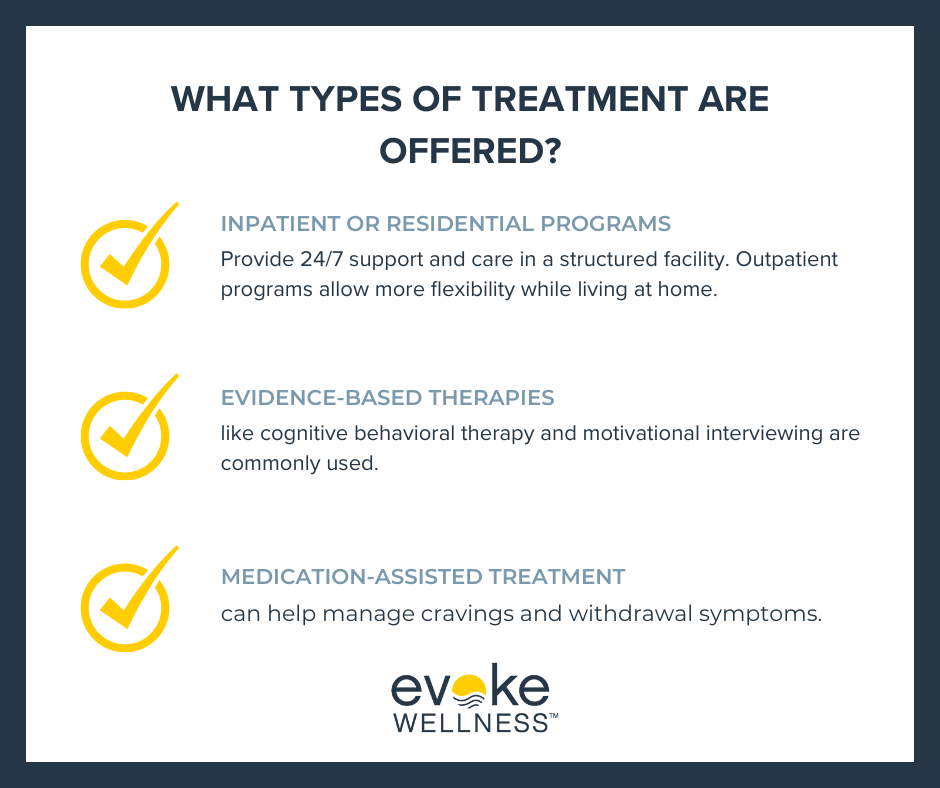As you contemplate seeking help for alcohol addiction, understanding what to expect during rehabilitation can ease your apprehensions. In Massachusetts, where 5.3% of adults struggle with alcohol use disorder, professional treatment programs offer a lifeline. At Evoke Wellness at Waltham, you’ll find comprehensive care tailored to your needs. From alcohol addiction treatment and therapy programs to dual diagnosis and mental health support, our approach addresses the complexities of recovery. This guide will walk you through the rehabilitation process, providing insights into the structured environment, evidence-based therapies, and supportive community that await you. By taking this courageous step, you’re joining the 14% of Americans in recovery who have transformed their lives.
Together, let’s embrace the journey to recovery and the promise of a new beginning. Call us at (833) 287-7223 today or reach out online.
What to Expect During an Alcohol Rehabilitation Program
During an alcohol rehabilitation program at Evoke Wellness at Waltham, you can expect a comprehensive, personalized approach to help you build a strong foundation for lasting sobriety and recovery.
Evidence-Based Therapies
The program utilizes evidence-based therapies like Cognitive-Behavioral Therapy (CBT), Dialectical-Behavioral Therapy (DBT), EMDR, and Family Integration to address the root causes of addiction and develop healthy coping mechanisms. Group Therapy sessions provide a supportive environment for healing.
Holistic Approaches
In addition to traditional therapies, holistic approaches like Mindfulness and Meditation, nutrition education, and wellness activities are incorporated to promote physical, emotional, and spiritual well-being.
Personalized Treatment Plans
You can expect a personalized treatment plan tailored to your unique needs, which may include a combination of individual counseling, group sessions, medication-assisted treatment, and access to support services like case management and aftercare planning.
Continuum of Care
Depending on your specific situation, you may participate in Day Treatment, Night Treatment (Night Treatment), or Rehab Aftercare programs, ensuring a continuum of care and support throughout your recovery journey.
The program’s ultimate goal is to empower you with the skills and resources needed to maintain long-term sobriety, improve your overall well-being, and regain control of your life.
Recognizing Alcohol Problems: How Much is Too Much?
Signs of Excessive Drinking
Alcohol use disorder affects over 28 million adults in the U.S., making it crucial to recognize the warning signs. If you find yourself hiding alcohol consumption, experiencing declining performance at work or school, distancing from loved ones, or being unable to quit despite attempts, these could signal a drinking problem.
When Drinking Becomes Problematic
Heavy drinking, defined as more than 8 drinks per week for women and 15 for men, as well as binge drinking, increases the risk of developing alcohol dependence. Physical dependence can manifest in a matter of days or weeks as the body becomes accustomed to alcohol’s presence.
Seeking Professional Help
If you suspect a drinking problem, it’s essential to take action. Start by learning about alcohol addiction and withdrawal symptoms, which can be life-threatening without proper medical care. Have an open conversation with the individual about your concerns for their health and well-being. Research local alcohol rehab centers like Evoke Waltham, which offers comprehensive treatment programs, including residential, day treatment, and outpatient options. Offer to accompany the person to the treatment center and provide ongoing support throughout their recovery journey.
Why do People go to Rehab?
Seeking professional treatment at a rehabilitation center is often the first step towards overcoming addiction. People decide to go to rehab for various reasons, but the primary goal is to break free from the vicious cycle of substance abuse and reclaim control over their lives.
A Path to Recovery
Addiction is a chronic disease that requires comprehensive treatment. According to SAMHSA, successful recovery involves four key aspects: a stable home environment, a positive community, a sense of purpose, and good physical and mental health. Rehab facilities provide the necessary support and resources to address these aspects, guiding individuals towards lasting sobriety.
Dual Diagnosis Treatment
Many individuals struggling with addiction also grapple with co-occurring mental health disorders, such as depression or anxiety. Up to 60% of people with a substance use disorder also have another mental illness. Rehab centers like Evoke Waltham offer dual diagnosis treatment, addressing both substance abuse and underlying mental health issues simultaneously for a comprehensive approach to recovery.
Comprehensive Care and Support
Rehabilitation programs provide a structured environment with 24/7 medical supervision, counseling, and therapy tailored to individual needs. At Evoke Waltham, patients receive personalized treatment plans, including detoxification, individual and group therapy, and aftercare planning. This comprehensive approach equips individuals with the tools and support necessary for long-term sobriety.
What is Rehab?
Addiction Treatment Programs
Rehab or rehabilitation refers to the comprehensive treatment programs designed to help individuals overcome substance abuse disorders and achieve long-term sobriety. Evoke Wellness in Waltham, MA offers a range of evidence-based addiction treatment programs tailored to each patient’s unique needs. These include night treatments (Night Treatment), medication-assisted treatment (MAT), and day treatment programs that combine group therapy, individual counseling, and life skills development.
Integrated Care Approach
The key to effective rehab is an integrated approach that addresses both the physical and mental health aspects of addiction. According to recent studies, dual diagnosis treatment that tackles co-occurring mental health issues alongside substance abuse is crucial for long-term recovery. Additionally, family involvement and ongoing support after completing the program are vital components of successful rehabilitation.
Personalized Treatment Plans
At Evoke Waltham, licensed therapists, psychologists, and addiction specialists work together to create personalized treatment plans for each patient. These plans may incorporate various evidence-based therapies, such as cognitive-behavioral therapy (CBT), dialectical-behavior therapy (DBT), EMDR, mindfulness and meditation, and trauma-focused therapy. The goal is to help patients develop coping mechanisms, improve decision-making skills, and build a strong foundation for a sober, fulfilling life.
A Typical Day in a Rehab Facility
Structured Schedules
A typical day in a rehab facility is highly structured to help patients stay focused on their recovery goals. The daily routine often begins with a healthy breakfast, followed by individual or group therapy sessions. According to an Evoke Waltham blog, evidence-based therapies like cognitive-behavioral therapy (CBT) and dialectical-behavioral therapy (DBT) are commonly used to help patients identify and change negative thought patterns and behaviors.
Holistic Healing
In addition to traditional therapies, many rehab facilities incorporate holistic activities like yoga, meditation, and art therapy into their daily schedules. These practices can help patients develop coping mechanisms, reduce stress, and find meaning and purpose in their journey toward recovery. As noted on the Evoke Waltham blog, patients are encouraged to embrace healthy habits and routines, such as regular exercise and healthy eating, to support their overall well-being.
Building a Support System
Throughout the day, patients have opportunities to attend support group meetings and participate in activities designed to foster a sense of community and accountability. Evoke Waltham recommends maintaining a contact list of at least 50 people in recovery who can provide support during difficult times and help prevent relapse. The rehab environment aims to create a supportive social network that can be carried forward after completing the program.
Therapy Programs Offered in Rehab
As an individual seeking recovery from alcohol addiction, you have access to a comprehensive range of therapy programs at Evoke Wellness at Waltham. These evidence-based approaches are designed to promote holistic healing and equip you with the necessary skills to maintain lasting sobriety.
Cognitive-Behavioral Therapy (CBT)
CBT is a powerful tool that helps you identify and modify negative thought patterns and behaviors contributing to addiction. Through this approach, you’ll learn to challenge irrational beliefs, develop healthier coping mechanisms, and cultivate a more positive mindset.
Dialectical-Behavioral Therapy (DBT)
DBT is a highly effective therapy that teaches you skills for emotional regulation, distress tolerance, and interpersonal effectiveness. This approach empowers you to manage intense emotions, build resilience, and improve your ability to maintain healthy relationships – all crucial components of sustainable recovery.
Trauma Therapy Program
Many individuals struggle with substance abuse as a coping mechanism for unresolved trauma. The Trauma Therapy Program at Evoke Waltham helps you process and heal from past traumatic experiences, addressing the root causes of your addiction and promoting long-term emotional well-being.
Holistic Addiction Therapy
In addition to traditional therapies, Evoke Waltham offers a holistic approach to addiction treatment. Incorporating mindfulness, meditation, and other complementary practices, this program addresses the mind-body connection, promoting overall wellness and providing you with valuable tools for self-care and stress management.
With a diverse range of therapy programs tailored to your unique needs, Evoke Wellness at Waltham empowers you to embark on a transformative journey towards a life of sobriety and fulfillment.
Dual Diagnosis Treatment for Co-Occurring Disorders
Integrated Approach
Treating co-occurring substance use and mental health disorders requires an integrated approach that addresses both issues simultaneously. Evoke Waltham specializes in dual diagnosis treatment, offering individualized programs covering the full spectrum of care.
Evidence-Based Therapies
Their experienced team provides comprehensive, evidence-based therapies like cognitive-behavioral therapy (CBT) and dialectical behavior therapy (DBT). These approaches help identify and change harmful thought patterns, behaviors, and manage emotional reactions contributing to addiction and mental illness.
Personalized Care
Evoke Waltham’s dual diagnosis treatment plans are personalized to each individual’s unique needs. They combine various therapies, such as medication-assisted treatment, to break the cycle of self-medication and support lasting recovery from co-occurring disorders.
Mental Health Treatment in Rehab
Comprehensive Approach
At our rehab facility, we understand the strong link between substance abuse and mental health disorders. That’s why our mental health treatment programs are fully integrated into the overall addiction recovery process. Using evidence-based therapies, we provide a comprehensive approach to address co-occurring conditions simultaneously.
Tailored Care
We offer specialized mental health programs tailored to specific needs, such as gender-specific treatment and LGBTQ+ support. Our range of therapies includes Cognitive Behavioral Therapy (CBT), Dialectical Behavior Therapy (DBT), EMDR, psychotherapy, trauma therapy, and mindfulness practices.
Ongoing Support
Recovery is a lifelong journey. That’s why our aftercare plans emphasize ongoing mental health support to help you maintain sobriety and emotional well-being. Through our alumni community and counseling resources, you’ll have access to the tools needed for lasting healing.
FAQ on Alcohol Addiction Treatment Programs in Massachusetts
How long does treatment last?
Treatment duration varies based on individual needs. Short-term programs may last a few weeks, while long-term can be 60-90 days or more. Continuing care through outpatient treatment, sober living, or support groups promotes lasting recovery.
Does insurance cover rehab?
Many insurance plans cover at least a portion of addiction treatment costs. Evoke Wellness at Waltham works with most major providers to maximize benefits. Financial assistance may also be available for those without insurance.
How do I choose a program?
Consider location, treatment approaches, staff credentials, amenities and cost. Reputable programs are accredited and licensed. Take a tour and speak to alumni if possible to get a feel for the environment.
Conclusion
As you embark on your journey to recovery, remember that an alcohol rehabilitation program offers a comprehensive approach to healing. By participating in evidence-based therapies, addressing co-occurring mental health issues, and developing essential coping skills, you’ll be well-equipped to maintain long-term sobriety. Recent studies show that Massachusetts has seen a 15% increase in successful alcohol addiction treatment outcomes over the past five years. With dedicated professionals and a supportive environment, you can join the growing number of individuals who have reclaimed their lives from alcohol addiction. Take the first step towards a healthier, more fulfilling future by reaching out to Evoke Wellness at Waltham today.
Begin Your Journey with Evoke Wellness at Waltham
If you or a loved one is considering outpatient treatment, Evoke Wellness at Waltham invites you to contact us. Our compassionate team is ready to answer your questions, discuss your needs, and help you take the first steps toward recovery. At Evoke Wellness, you will find more than just a treatment program – you’ll discover a community dedicated to your wellness and success. Together, let’s embrace the journey to recovery and the promise of a new beginning. Call us at (833) 287-7223 today or reach out online.



